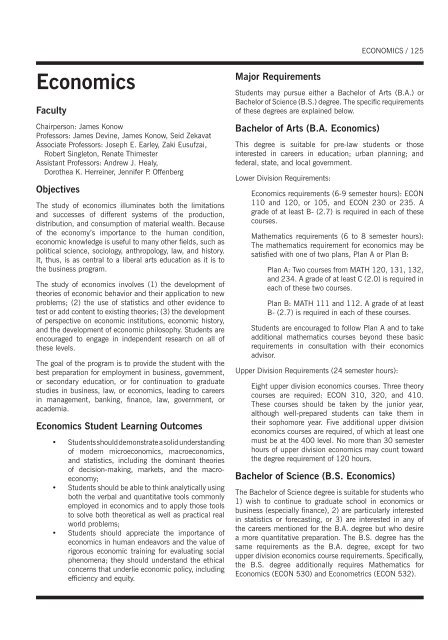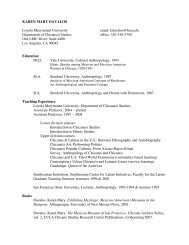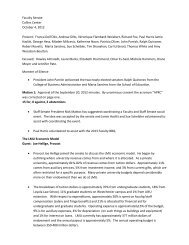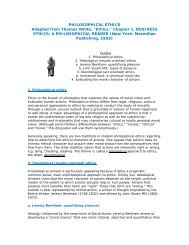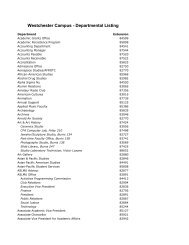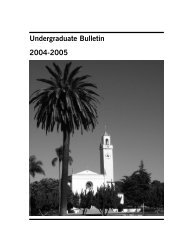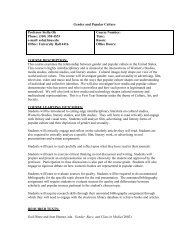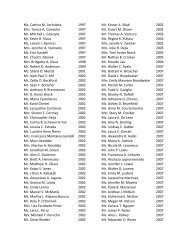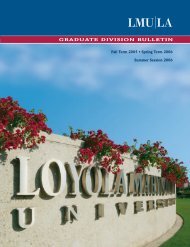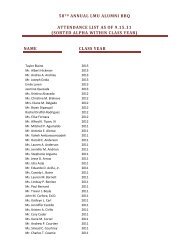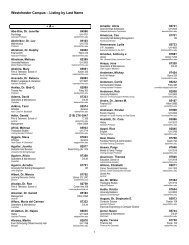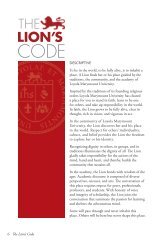- Page 1 and 2:
Undergraduate Bulletin 2006-2007
- Page 3 and 4:
University Phone Numbers Westcheste
- Page 5 and 6:
ACADEMIC CALENDAR / 5 Feb 9 F Last
- Page 7 and 8:
The University History The names
- Page 9 and 10:
Goals Loyola Marymount University p
- Page 11 and 12:
Membership Loyola Marymount Univers
- Page 13 and 14:
University Facilities Academic A co
- Page 15 and 16:
Student-Managed Social and Recreati
- Page 17 and 18:
University Services Campus Ministry
- Page 19 and 20:
Computer Labs and Villages The Univ
- Page 21 and 22:
Alumni Association The Loyola Marym
- Page 23 and 24:
Student Affairs The Division of Stu
- Page 25 and 26:
The award-winning Burns Recreation
- Page 27 and 28:
By the end of the first year at LMU
- Page 29 and 30:
KXLU/KLMU As one of the only opport
- Page 31 and 32:
Admission Loyola Marymount Universi
- Page 33 and 34:
Credit for work completed at instit
- Page 35 and 36:
AP Exam Minimum AP Score Required N
- Page 37 and 38:
If a student repeats a course, the
- Page 39 and 40:
Cal Grant A is a grant awarded by t
- Page 41 and 42:
Nanette Salamunovich Goodman Schola
- Page 43 and 44:
Rev. Alfred J. Kilp, S.J., Alumni S
- Page 45 and 46:
Orientation Fee (non-refundable man
- Page 47 and 48:
The University strives to meet the
- Page 49 and 50:
University Core Curriculum Goals an
- Page 51 and 52:
Students in the College of Communic
- Page 53 and 54:
Academic Degrees and Programs Under
- Page 55 and 56:
M.A. ..............Pastoral Theolog
- Page 57 and 58:
Academic Probation Academic probati
- Page 59 and 60:
D. Intentional Violation: If the In
- Page 61 and 62:
Arrangements to undertake an Indepe
- Page 63 and 64:
A grade of A may be modified by a m
- Page 65 and 66:
6. A minor may be earned only while
- Page 67 and 68:
After the deadline, and before the
- Page 69 and 70:
The student’s program is then for
- Page 71 and 72:
The program costs (comparable to th
- Page 73 and 74: Thomas and Dorothy Leavey Center fo
- Page 75 and 76: ACADEMIC AWARDS AND COMMENCEMENT HO
- Page 77 and 78: University Academic Awards For stud
- Page 79 and 80: Sr. Raymunde McKay, R.S.H.M., Servi
- Page 81 and 82: University Honors Program All Unive
- Page 83 and 84: HNRS 497 Honors Thesis 1-2 Semester
- Page 85 and 86: Bellarmine College of Liberal Arts
- Page 87 and 88: Critical and Creative Arts 6 Semest
- Page 89 and 90: African American Studies Faculty Ac
- Page 91 and 92: Sophomore Year Fall Semester S.H. o
- Page 93 and 94: AFAM 485 African American Social Th
- Page 95 and 96: AMCS 300 Advanced Survey of America
- Page 97 and 98: Asian and Pacific Studies Model Fou
- Page 99 and 100: ASPA 490 Asian Women Writers 3 Seme
- Page 101 and 102: APAM 435 Asian Pacific American Wom
- Page 103 and 104: Catholic Studies Director: José Ig
- Page 105 and 106: Chicana/o Studies Faculty Chairpers
- Page 107 and 108: CHST 298 Special Studies 1-3 Semest
- Page 109 and 110: Classics and Archaeology Faculty Ch
- Page 111 and 112: Upper Division Requirements: GREK 3
- Page 113 and 114: Classical Civilizations Model Four-
- Page 115 and 116: Senior Year Fall Semester S.H. GREK
- Page 117 and 118: CLCV 304 Art and Architecture of An
- Page 119 and 120: GREK 398 Special Studies 1-3 Semest
- Page 121 and 122: LATN 498 Special Studies 1-3 Semest
- Page 123: Modern Greek Objectives The Modern
- Page 127 and 128: Spring Semester S.H. or or or or EC
- Page 129 and 130: ECON 330 Regression Analysis 3 Seme
- Page 131 and 132: ECON 414 Game Theory 3 Semester Hou
- Page 133 and 134: English Faculty Chairperson: David
- Page 135 and 136: Pre-Journalism Curriculum Although
- Page 137 and 138: Spring Semester S.H. or or ENGL 371
- Page 139 and 140: ENGL 301 Writing for Journalism I:
- Page 141 and 142: ENGL 371 American Literature I 3 Se
- Page 143 and 144: ENGL 502 The Arthurian Romance 3 Se
- Page 145 and 146: ENGL 553 American Realism and Natur
- Page 147 and 148: ENGL 584 The Black Aesthetic 3 Seme
- Page 149 and 150: European Studies Director Petra Lie
- Page 151 and 152: Spring Semester S.H. or PHIL 160 Ph
- Page 153 and 154: Geography Director Peter Hoffman Ob
- Page 155 and 156: History Faculty Chairperson: John H
- Page 157 and 158: Spring Semester S.H. HIST ___ HIST
- Page 159 and 160: HIST 418 From Viking to Crusader 3
- Page 161 and 162: HIST 462 Founding Fathers 3 Semeste
- Page 163 and 164: HIST 491 South Africa 3 Semester Ho
- Page 165 and 166: 6 semester hours in either an ancie
- Page 167 and 168: Irish Studies Director John Menagha
- Page 169 and 170: Note: Courses offered in other depa
- Page 171 and 172: LIBA 299 Independent Studies 1-3 Se
- Page 173 and 174: HIST 366: History of California (3
- Page 175 and 176:
Spring Semester S.H. EDUC 410 Direc
- Page 177 and 178:
CHIN 203 Intermediate Chinese I 3 S
- Page 179 and 180:
Foreign Literature in English Trans
- Page 181 and 182:
Spring Semester S.H. or or FREN 204
- Page 183 and 184:
FREN 431 French/Francophone Film 3
- Page 185 and 186:
GRMN 203 Intermediate German I 3 Se
- Page 187 and 188:
ITAL 102 Elementary Italian II 3 Se
- Page 189 and 190:
JAPN 203 Intermediate Japanese I 3
- Page 191 and 192:
Major Requirements Lower Division R
- Page 193 and 194:
Spring Semester S.H. SPAN 500 Senio
- Page 195 and 196:
SPAN 204 Intermediate Spanish II 3
- Page 197 and 198:
SPAN 443 Latin American Women Write
- Page 199 and 200:
Peace Studies Director Daniel L. Sm
- Page 201 and 202:
Honors in Philosophy To graduate wi
- Page 203 and 204:
PHIL 321 Bioethics 3 Semester Hours
- Page 205 and 206:
PHIL 366 Philosophy of Religion 3 S
- Page 207 and 208:
Political Science Faculty Chairpers
- Page 209 and 210:
Senior Year Fall Semester S.H. POLS
- Page 211 and 212:
POLS 520 Modes of Political Inquiry
- Page 213 and 214:
POLS 353 Politics in the Middle Eas
- Page 215 and 216:
POLS 571 The Law and Presidential P
- Page 217 and 218:
Psychology Student Learning Outcome
- Page 219 and 220:
Freshman Year Fall Semester S.H. EN
- Page 221 and 222:
Students may take no more than ten
- Page 223 and 224:
PSYC 330 Forensic Psychology 3 Seme
- Page 225 and 226:
PSYC 442 Psychological Assessment 3
- Page 227 and 228:
PSYC 598 Special Studies 1-3 Semest
- Page 229 and 230:
Freshman Year Fall Semester S.H. or
- Page 231 and 232:
SOCL 422 Criminal Justice 3 Semeste
- Page 233 and 234:
SOCL 454 Religion, Culture, and Soc
- Page 235 and 236:
One additional upper division THST
- Page 237 and 238:
THST 110 Introduction to the New Te
- Page 239 and 240:
THST 415 New Testament Theology 3 S
- Page 241 and 242:
Area C: Faith, Culture, and Ministr
- Page 243 and 244:
Urban Studies Director Peter R. Hof
- Page 245 and 246:
Freshman Year Fall Semester S.H. or
- Page 247 and 248:
Women’s Studies Faculty Chairpers
- Page 249 and 250:
Senior Year Fall Semester S.H. WNST
- Page 251 and 252:
WNST 366 The American Family (See H
- Page 253 and 254:
College of Business Administration
- Page 255 and 256:
Philosophy 6 Semester Hours Course
- Page 257 and 258:
Finance ENTR 461 Technology Venture
- Page 259 and 260:
Upper division business courses may
- Page 261 and 262:
Accounting Faculty Chairperson: Mah
- Page 263 and 264:
Finance, Computer Information Syste
- Page 265 and 266:
Computer Information Systems and Op
- Page 267 and 268:
Management, Entrepreneurship, and I
- Page 269 and 270:
MGMT 451 Business Practices in a Gl
- Page 271 and 272:
INBA 445 International Marketing (S
- Page 273 and 274:
BLAW 408 Real Estate Law 3 Semester
- Page 275 and 276:
MRKT 465 Marketing Promotional Stra
- Page 277 and 278:
Travel and Tourism Director Alan K.
- Page 279 and 280:
TOUR 496 Travel and Tourism Informa
- Page 281 and 282:
COMMUNICATION AND FINE ARTS / 281 C
- Page 283 and 284:
Social Sciences 6 Semester Hours St
- Page 285 and 286:
Art and Art History Faculty Chairpe
- Page 287 and 288:
Art History ARHS 100 Art and Its Hi
- Page 289 and 290:
ARHS 449 Junior/Senior Seminar in A
- Page 291 and 292:
Junior Year Fall Semester S.H. ART
- Page 293 and 294:
Spring Semester S.H. ART 154 Drawin
- Page 295 and 296:
Spring Semester S.H. ART 360 Graphi
- Page 297 and 298:
Spring Semester S.H. ART 494 Multim
- Page 299 and 300:
ART 301 Figure Workshop II 1 Semest
- Page 301 and 302:
ART 372 Jewelry I 3 Semester Hours
- Page 303 and 304:
ART 468 Typography II 3 Semester Ho
- Page 305 and 306:
Spring Semester S.H. CMST 351 Conte
- Page 307 and 308:
CMST 301 Theories of Human Communic
- Page 309 and 310:
CMST 490 Communication Practicum I
- Page 311 and 312:
Lower Division Requirements: A mini
- Page 313 and 314:
Sophomore Year Fall Semester S.H. D
- Page 315 and 316:
DANC 220 Ballet II 0-2 Semester Hou
- Page 317 and 318:
DANC 378 Service Project 0-1 Semest
- Page 319 and 320:
DANC 480 Kinesiology for Dancers I
- Page 321 and 322:
Music Faculty Chairperson: Mary Cat
- Page 323 and 324:
Music Minor Curriculum 21 Semester
- Page 325 and 326:
Spring Semester S.H. MUSC 318 Music
- Page 327 and 328:
MUSC 181 Guitar, Percussion, Piano,
- Page 329 and 330:
MUSC 331 Score Reading II 2 Semeste
- Page 331 and 332:
MUSC 413 Music of the Baroque 3 Sem
- Page 333 and 334:
MUSC 492 Chamber Music Ensembles 0-
- Page 335 and 336:
Spring Semester S.H. THEA 245 Weste
- Page 337 and 338:
THEA 252 Workshop: Playwrights and
- Page 339 and 340:
THEA 422 Advanced Costume Design 3
- Page 341 and 342:
Frank R. Seaver College of Science
- Page 343 and 344:
Teacher Preparation Programs The Co
- Page 345 and 346:
International/Global Studies Studen
- Page 347 and 348:
Critical/Creative Arts 6 Semester H
- Page 349 and 350:
Biology Faculty Chairperson: Martin
- Page 351 and 352:
Senior Year Fall Semester S.H. BIOL
- Page 353 and 354:
BIOL 201 Cell Function 3 Semester H
- Page 355 and 356:
BIOL 319 Ecology Laboratory 1 Semes
- Page 357 and 358:
BIOL 376 Genetics Laboratory 1 Seme
- Page 359 and 360:
BIOL 490 Biological Teaching 1-2 Se
- Page 361 and 362:
Chemistry and Biochemistry Faculty
- Page 363 and 364:
Spring Semester S.H. CHEM 490 Chemi
- Page 365 and 366:
Senior Year Fall Semester S.H. BIOL
- Page 367 and 368:
CHEM 298 Special Studies: Chemistry
- Page 369 and 370:
CHEM 470 Biochemistry I 3 Semester
- Page 371 and 372:
Civil Engineering and Environmental
- Page 373 and 374:
Spring Semester S.H. CIVL 302 Seism
- Page 375 and 376:
Civil Engineering CIVL 200 Mechanic
- Page 377 and 378:
CIVL 498 Special Studies 1-4 Semest
- Page 379 and 380:
ENVS 513 Solid Wastes Engineering 2
- Page 381 and 382:
Electrical Engineering Curriculum (
- Page 383 and 384:
Junior Year Fall Semester S.H. CMSI
- Page 385 and 386:
ELEC 383 Introduction to Microproce
- Page 387 and 388:
ELEC 567 Introduction to Digtial VL
- Page 389 and 390:
Senior Year Fall Semester S.H. CMSI
- Page 391 and 392:
CMSI 371 Computer Graphics 3 Semest
- Page 393 and 394:
General Engineering A General Engin
- Page 395 and 396:
Mathematics Faculty Acting Chairper
- Page 397 and 398:
Minor in Secondary Education Mathem
- Page 399 and 400:
Spring Semester S.H. MATH 322** Rea
- Page 401 and 402:
MATH 106 Mathematics for Elementary
- Page 403 and 404:
MATH 301 Mathematical Ideas for Fut
- Page 405 and 406:
MATH 495 Mathematical Modeling 3 Se
- Page 407 and 408:
Mechanical Engineering Faculty Chai
- Page 409 and 410:
Senior Year Fall Semester S.H. MECH
- Page 411 and 412:
MECH 340 Engineering Systems II 3 S
- Page 413 and 414:
MECH 527 Finite Elements Methods 3
- Page 415 and 416:
B.S. Degree in Natural Science Gene
- Page 417 and 418:
Junior Year Fall Semester S.H. ____
- Page 419 and 420:
B.S. Degree in Natural Science Seco
- Page 421 and 422:
B.S. Degree in Athletic Training (1
- Page 423 and 424:
Spring Semester S.H. BIOL 102 Gener
- Page 425 and 426:
NTLS 250 The Blue Planet: Introduct
- Page 427 and 428:
NTLS 320 Science, Theology, and the
- Page 429 and 430:
NTLS 396 Occupational Therapy Inter
- Page 431 and 432:
NTLS 510 Chemistry for Environmenta
- Page 433 and 434:
Physics Curriculum (125 S.H.) Fresh
- Page 435 and 436:
PHYS 101 Introduction to Mechanics
- Page 437 and 438:
PHYS 298 Special Studies 1-4 Semest
- Page 439 and 440:
School of Education EDUCATION / 439
- Page 441 and 442:
• Collaborate and share leadershi
- Page 443 and 444:
• Subject Matter Plan of Action c
- Page 445 and 446:
• Complete the following methods
- Page 447 and 448:
• Subject Matter Plan of Action C
- Page 449 and 450:
Minor in Education Students may dec
- Page 451 and 452:
EDUC 414 Theories of Second Languag
- Page 453 and 454:
EDUC 456 Directed Teaching with Cul
- Page 455 and 456:
EDUC 8000 Health Education 1 Extens
- Page 457 and 458:
School of Film and Television Admin
- Page 459 and 460:
Philosophy 6 Semester Hours Course
- Page 461 and 462:
Animation Major Requirements Lower
- Page 463 and 464:
ANIM 199 Independent Studies 1-3 Se
- Page 465 and 466:
Production—Film and Television Ob
- Page 467 and 468:
Film and Television Studies FTVS 10
- Page 469 and 470:
FTVS 516 Working with Actors 3 Seme
- Page 471 and 472:
PROD 450 Production IV (non-fi ctio
- Page 473 and 474:
Recording Arts Lower Division Requi
- Page 475 and 476:
RECA 367 Production Sound 3 Semeste
- Page 477 and 478:
Spring Semester S.H. SCWR 321 Compl
- Page 479 and 480:
Department of Aerospace Studies AER
- Page 481 and 482:
AERO 100 The Foundation of the Unit
- Page 483 and 484:
Campus Maps CAMPUS MAPS / 483
- Page 485 and 486:
University Administration UNIVERSIT
- Page 487 and 488:
Regents of the University William D
- Page 489 and 490:
Academic Administration Marcia L. A
- Page 491 and 492:
University Faculty UNIVERSITY FACUL
- Page 493 and 494:
SUSAN TORREY BARBER (1991) Associat
- Page 495 and 496:
S.W. TINA CHOE (1996) Associate Pro
- Page 497 and 498:
ELLEN A. ENSHER (1997) Associate Pr
- Page 499 and 500:
FERNANDO J. GUERRA (1987) Associate
- Page 501 and 502:
LILY KHADJAVI (1999) Associate Prof
- Page 503 and 504:
DAVID MARCHESE (2005) Adjunct Profe
- Page 505 and 506:
JENNIFER P. OFFENBERG (2005) Assist
- Page 507 and 508:
THOMAS P. RAUSCH, S.J. (1967-69; 19
- Page 509 and 510:
JEFFREY S. SIKER (1987) Professor o
- Page 511 and 512:
KEVIN J. WETMORE, JR. (2005) Assist
- Page 513 and 514:
Faculty Emeriti BERNARD V. ABBENE C
- Page 515 and 516:
Index A Academic Advising .........
- Page 517 and 518:
Liberal Arts Courses ..............
- Page 520:
Updates to the Undergraduate Bullet


